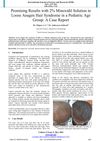 3 citations,
February 2005 in “Expert Opinion on Investigational Drugs”
3 citations,
February 2005 in “Expert Opinion on Investigational Drugs” New treatments for hair loss are being developed using molecular biology.
 1 citations,
October 2023 in “Dermatology and therapy”
1 citations,
October 2023 in “Dermatology and therapy” Some treatments for severe hair loss work but often have side effects, with baricitinib showing the most promise.
 1 citations,
July 2018 in “Elsevier eBooks”
1 citations,
July 2018 in “Elsevier eBooks” Many treatments for hair loss show potential, but more testing is needed to confirm their effectiveness. Only minoxidil for women and minoxidil and finasteride for men are FDA approved.
 1 citations,
February 2018 in “Madridge journal of dermatology & research”
1 citations,
February 2018 in “Madridge journal of dermatology & research” The plant extract remedy Satura® Rosta promotes hair growth and regrowth without negative effects.
 1 citations,
January 2015 in “Journal of clinical and investigative dermatology”
1 citations,
January 2015 in “Journal of clinical and investigative dermatology” IGF-1 from human placenta helps hair grow.
 1 citations,
August 2012 in “Food Science and Biotechnology”
1 citations,
August 2012 in “Food Science and Biotechnology” The essence made from fermented products increased hair growth in mice better than minoxidil.
 March 2024 in “bioRxiv (Cold Spring Harbor Laboratory)”
March 2024 in “bioRxiv (Cold Spring Harbor Laboratory)” Minoxidil treatment improves heart defects in a DiGeorge syndrome model.

Stopping minoxidil and draining fluid around the heart can save lives in rare cases.
 May 2023 in “International journal of science and research”
May 2023 in “International journal of science and research” 2% minoxidil solution improved hair density and quality in children with Loose Anagen Hair Syndrome.
 February 2021 in “Journal of pharmaceutical and biological sciences”
February 2021 in “Journal of pharmaceutical and biological sciences” No cure exists for alopecia areata, and treatments are personalized.
 April 2019 in “Advances in Cosmetic Surgery”
April 2019 in “Advances in Cosmetic Surgery” The document concludes that ongoing medical therapy is crucial for preventing hair loss, and surgical options can restore hair, with future treatments for hair loss being promising.
Avicennia Marina extract and avicequinone C can reduce hair loss hormone production and increase hair growth factors, suggesting they could be used to treat androgenic alopecia.
 April 2019 in “Journal of emerging technologies and innovative research”
April 2019 in “Journal of emerging technologies and innovative research” Early treatment of Female Pattern Hair Loss is important to stop it from getting worse, and various treatments can help, especially in mild to moderate cases.
 June 2018 in “Advances in Cosmetic Surgery”
June 2018 in “Advances in Cosmetic Surgery” Hair loss caused by genetics and hormones; more research needed for treatments.
 January 2012 in “Vitamins & trace elements”
January 2012 in “Vitamins & trace elements” Smoking and drinking can lower vitamin levels and potentially trigger early hair loss, but overall vitamin levels don't seem to affect hair loss duration.
 74 citations,
January 2015 in “Asian Journal of Transfusion Science”
74 citations,
January 2015 in “Asian Journal of Transfusion Science” Platelet-rich plasma (PRP) injections can effectively increase hair density and thickness in people with androgenic alopecia, without major side effects.
 2 citations,
January 2023 in “BioMed Research International”
2 citations,
January 2023 in “BioMed Research International” Beetroot extract nanogel may help treat hair loss caused by testosterone.
 1 citations,
January 2022 in “Journal of Biosciences and Medicines”
1 citations,
January 2022 in “Journal of Biosciences and Medicines” Understanding how androgens and their receptors work can lead to improved treatments for skin diseases.
 1 citations,
January 2010 in “Springer eBooks”
1 citations,
January 2010 in “Springer eBooks” Hair loss in androgenetic alopecia may be due to ongoing tiny inflammation and tissue changes around hair follicles.
5 citations,
March 2022 in “Frontiers in Cell and Developmental Biology” Colostrum-derived exosomes can promote hair growth and may be a promising treatment for hair loss.
 3 citations,
November 2019 in “DOAJ (DOAJ: Directory of Open Access Journals)”
3 citations,
November 2019 in “DOAJ (DOAJ: Directory of Open Access Journals)” Pumpkin seed oil may help hair grow and could be an alternative treatment for male hair loss.
1 citations,
December 2022 in “Journal of Controlled Release” Microneedles could be a better and easier way to regrow hair.
 October 2023 in “Current Issues in Molecular Biology”
October 2023 in “Current Issues in Molecular Biology” The YH complex, made from Astragalus membranaceus and Cinnamomum cassia, may help treat hair loss by promoting hair growth and follicle development.
 October 2023 in “Bioactive Materials”
October 2023 in “Bioactive Materials” The new hair loss treatment combining nitric oxide and minoxidil in a special carrier is effective for hair regrowth.
 January 2023 in “Health science reports”
January 2023 in “Health science reports” French maritime pine bark extract significantly increased hair density in menopausal women.
 January 2023 in “Dermatologic Therapy”
January 2023 in “Dermatologic Therapy” The nutritional supplement Pilopeptan® WOMAN improved hair growth and thickness in women with hair loss.
 January 2023 in “Journal of Cosmetics, Dermatological Sciences and Applications”
January 2023 in “Journal of Cosmetics, Dermatological Sciences and Applications” The hair growth serum Trichosera® was effective in increasing hair regrowth and density and reducing hair fall without significant side effects.
January 2023 in “Frontiers in Medicine” ALRV5XR is the most effective hair regrowth treatment at 24 weeks.
32 citations,
September 2013 in “Breast cancer research” A specific gene variant is linked to a higher risk of hair loss from chemotherapy in breast cancer patients.
44 citations,
September 2020 in “International Journal of Molecular Sciences” New treatments are needed for PCOS that target its genetic, hormonal, and metabolic causes.
























